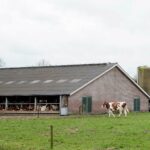National Open Farm Day is an Irish holiday observed every first Monday in May. This year the celebration falls on May 1. The National Open Farm Day is a result of a collaboration between the Ministry of Agriculture, the Rural Economy Research Center, and Järvamaa Avatud Talud. The aim to celebrate Open Farm Day is to inform the public about where their food originates from and how it ends up on their plates every day. On this day, visitors explore large and small farms, agricultural technologies, and a variety of animals and plants.
History of National Open Farm Day
Throughout human history, farming has been reinvented many times and in various places. The Neolithic Revolution marked the transition from hunter-gatherer to the established agricultural society, and it began roughly 12,000 years ago, around the start of the Holocene geological epoch. It was the world’s first historically proven agricultural revolution. Farming moved from the Middle East to Europe, and by 4,000 B.C., people in central Europe were pulling plows and wagons with oxen.The Columbian exchange which began in 1492 with Christopher Columbus’ travels introduced crops like maize, potatoes, and tomatoes to Europe as an addition to what was available — wheat, rice, and turnips, as well as cattle, to the Americas. Agriculture productivity has increased dramatically in industrialized countries and to a lesser extent in developing countries since 1900, as human labor has been replaced by mechanization, chemicals, and selective breeding.Agricultural productivity and net output in Britain surged between the 17th and the mid-19th century. Enclosure, mechanization, four-field crop rotation to retain soil nutrients, and selective breeding enabled a population increase of 5.7 million in 1750, which was unparalleled. In the mid-17th century, writers such as Samuel Hartlib, Walter Blith, and others began to offer advice on more profitable farming techniques in England.The British agricultural revolution in the 18th century as well as the green revolution in the second half of the 20th century prompted shifts in farming techniques. The green revolution was a series of research, development, and technology transfer activities that took place between the 1940s and the late 1970s. After the late 1960s, the green revolution boosted agricultural production all over the world.
National Open Farm Day timeline
Positive growth is evident in tillage.
English farmer Jethro Tull creates the horse-drawn cultivator and seed drill.
The new legislation removes the limits on Irish cattle exports.
Ireland accounts for a large portion of imports.
National Open Farm Day FAQs
What is involved in farming?
Farming entails preparing plant and animal goods for human consumption as well as their distribution to markets.
What happens on a farm?
Cleaning and tending to livestock, plowing, planting and harvesting crops, tractor driving, and other general handiwork are all tasks that a normal farmer will perform.
What is the difference between a farm and farming?
A farm is a place where farming takes place, while the activity of putting agriculture into action is known as farming.
How to Observe National Open Farm Day
-
Attend a cultivation workshop
Learn more about what goes on at a farm by attending a cultivation workshop. Some farms host workshops to help others learn how to cultivate their food. Seize the opportunity to learn something new on National Open Farm Day!
-
Visit a farm
Get the farm experience by visiting a farm near you. Witness life on large and small farms, cutting-edge agricultural technologies, and a wide range of animals, and flora.
-
Spread awareness
Share video snippets and pictures of your visit to a farm on National Open Farm Day. Join in raising awareness of what happens on a working farm and encourage others to understand more about where their food comes from. Don't forget to use the #openfarm hashtag on your posts.
5 Interesting Facts About Farming
-
Female Farmers
Today’s farmers are made up of 30% women.
-
70% more produce by 2050
Farmers will need to produce 70% more food to support the world’s rising population by 2050.
-
Important employment source
Agriculture is one of the most important sources of employment, and it is booming.
-
Contributes to development
Agriculture is critical to the economic development of a country.
-
Farming yields raw materials
Cotton, sugar, wood, and palm oil are just a few of the raw commodities provided by agriculture.
Why National Open Farm Day is Important
-
It aids environmental healing
Agriculture can damage or heal. Biodiverse farming techniques are beneficial to the environment. Healthy soil, less erosion, enhanced water conservation, and happier pollinators are all benefits of increased biodiversity.
-
A primary income source
Farming is the primary source of income for the majority of people. Agriculture is a source of income for over 70% of the population. This high percentage in agriculture is the result of the lack of growth of non-agricultural activities to absorb the rapidly rising population.
-
Provides food for mankind
Farmers are responsible for the food we consume daily. Through farming, the survival of mankind is guaranteed and it boosts economic development and results in improved living standards.
National Open Farm Day dates
| Year | Date | Day |
|---|---|---|
| 2022 | May 2 | Monday |
| 2023 | May 1 | Monday |
| 2024 | May 6 | Monday |
| 2025 | May 5 | Monday |
| 2026 | May 4 | Monday |



























